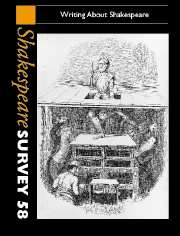Book contents
- Frontmatter
- Having Our Will: Imagination in Recent Shakespeare Biographies
- Toward a New Biography of Shakespeare
- Jonson, Shakespeare and the Exorcists
- ‘Lending soft audience to my sweet design’: Shifting Roles and Shifting Readings of Shakespeare’s ‘A Lover’s Complaint’
- ‘Armed at point exactly’: The Ghost in Hamlet
- Writing About Motive: Isabella, the Duke and Moral Authority
- Writing Performance: How to Elegize Elizabethan Actors
- Elizabeth Montagu: ‘Shakespear’s poor little Critick’?
- Rewriting Lear’s Untender Daughter: Fanny Price as a Regency Cordelia in Jane Austen’s Mansfield Park
- The Prequel as Palinode: Mary Cowden Clarke’s Girlhood of Shakespeare’s Heroines
- Shakespeare Among the Workers
- Virginia Woolf Reads Shakespeare: Or, her Silence on Master William
- Shakespeare and the Invention of the Epic Theatre: Working with Brecht
- Dramatizing the Dramatist
- Shakespeare in Drama Since 1990: Vanishing Act
- Writing about [Shakespearian] performance
- Shakespeare and the Prospect of Presentism
- Writing Shakespeare in the Global Economy
- The ‘Complexion’ of Twelfth Night
- Translation as Appropriation: Vassilis Rotas, Shakespeare and Modern Greek
- How Old Were Shakespeare’s Boy Actors?
- Mistress Tale Porter and the Triumph of Time: Slander and Old Wives’ Tales in The Winter’s Tale
- Shakespeare Performances in Ireland, 2002–2004
- Shakespeare Performances in England, 2004
- Professional Shakespeare Productions in the British Isles January–December 2003
- The Year's Contributions to Shakespearian Study 1 Critical Studies
- 2 Shakespeare in Performance
- 3 Editions and Textual Studies
- Books Received
- Index
Dramatizing the Dramatist
Published online by Cambridge University Press: 28 March 2007
- Frontmatter
- Having Our Will: Imagination in Recent Shakespeare Biographies
- Toward a New Biography of Shakespeare
- Jonson, Shakespeare and the Exorcists
- ‘Lending soft audience to my sweet design’: Shifting Roles and Shifting Readings of Shakespeare’s ‘A Lover’s Complaint’
- ‘Armed at point exactly’: The Ghost in Hamlet
- Writing About Motive: Isabella, the Duke and Moral Authority
- Writing Performance: How to Elegize Elizabethan Actors
- Elizabeth Montagu: ‘Shakespear’s poor little Critick’?
- Rewriting Lear’s Untender Daughter: Fanny Price as a Regency Cordelia in Jane Austen’s Mansfield Park
- The Prequel as Palinode: Mary Cowden Clarke’s Girlhood of Shakespeare’s Heroines
- Shakespeare Among the Workers
- Virginia Woolf Reads Shakespeare: Or, her Silence on Master William
- Shakespeare and the Invention of the Epic Theatre: Working with Brecht
- Dramatizing the Dramatist
- Shakespeare in Drama Since 1990: Vanishing Act
- Writing about [Shakespearian] performance
- Shakespeare and the Prospect of Presentism
- Writing Shakespeare in the Global Economy
- The ‘Complexion’ of Twelfth Night
- Translation as Appropriation: Vassilis Rotas, Shakespeare and Modern Greek
- How Old Were Shakespeare’s Boy Actors?
- Mistress Tale Porter and the Triumph of Time: Slander and Old Wives’ Tales in The Winter’s Tale
- Shakespeare Performances in Ireland, 2002–2004
- Shakespeare Performances in England, 2004
- Professional Shakespeare Productions in the British Isles January–December 2003
- The Year's Contributions to Shakespearian Study 1 Critical Studies
- 2 Shakespeare in Performance
- 3 Editions and Textual Studies
- Books Received
- Index
Summary
Here are eight events in Shakespeare’s life and afterlife of which many readers of this article will be unaware:
(1) At the Kenilworth entertainments Leicester introduced to Queen Elizabeth ‘a lad / From Stratford-upon-Avon near this place / Beyond his years precocious’. Elizabeth quizzed young Shakespeare and her own protégé Francis Bacon about poetry and philosophy at length and both the boys were carried high in triumph.
(2) Arriving in London from Stratford, Shakespeare saved Southampton from serious injury or death by grabbing the bridle of the aristocrat’s horse as it was about to throw its mount into the river. Southampton rewarded him with a ring and his patronage, announcing ‘What nobler exercise for wealth than this – . . . to foster Genius.’
(3) But Shakespeare also applied to Raleigh for a place on the Virginia expedition that established the Roanoke colony in 1587. Raleigh had heard Shakespeare praised by Sir Philip Sidney as someone who had ‘the gift of words’ when he had listened to Shakespeare ‘reciting ballads’ at the Mermaid Tavern. Raleigh advised the young man to ‘cherish that gift’ rather than travel to America.
(4) Shakespeare and Marlowe fought in Deptford over Mary Fitton with whom both were in love. By accident, as Marlowe lunged at Shakespeare, ‘his arm [was] knocked up, striking his own forehead’ and Marlowe fell dead.
(5) John Manningham’s account of the occasion when Shakespeare had sex with a citizen in Burbage’s place with the retort ‘that William the Conqueror was before Richard the Third’ was inaccurate. Shakespeare had actually forestalled Lord Wilson from wooing the actress Clarence with the line ‘Richard III comes too late. William the Conqueror commands the fortress.’
(6) ‘Tomorrow and tomorrow and tomorrow’ was written in response to Burbage’s demand for a soliloquy for Macbeth mourning Lady Macbeth. Burbage had proposed that it should begin ‘O dearest chuck, it is unkind indeed / To leave me in the midst of my sore need.’
(7)...
- Type
- Chapter
- Information
- Shakespeare Survey , pp. 137 - 147Publisher: Cambridge University PressPrint publication year: 2005
- 1
- Cited by

